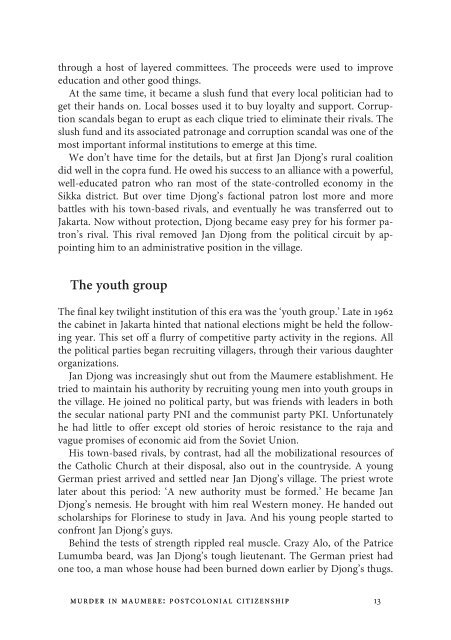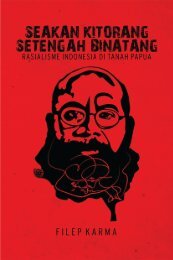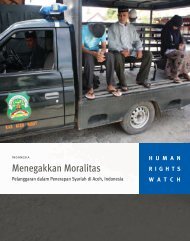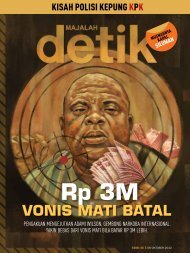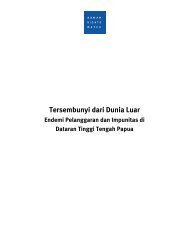Postcolonial Citizenship
PDF-6104Weboratie_Van_Klinken_-_DEF
PDF-6104Weboratie_Van_Klinken_-_DEF
Create successful ePaper yourself
Turn your PDF publications into a flip-book with our unique Google optimized e-Paper software.
through a host of layered committees. The proceeds were used to improve<br />
education and other good things.<br />
At the same time, it became a slush fund that every local politician had to<br />
get their hands on. Local bosses used it to buy loyalty and support. Corruption<br />
scandals began to erupt as each clique tried to eliminate their rivals. The<br />
slush fund and its associated patronage and corruption scandal was one of the<br />
most important informal institutions to emerge at this time.<br />
We don’t have time for the details, but at first Jan Djong’s rural coalition<br />
did well in the copra fund. He owed his success to an alliance with a powerful,<br />
well-educated patron who ran most of the state-controlled economy in the<br />
Sikka district. But over time Djong’s factional patron lost more and more<br />
battles with his town-based rivals, and eventually he was transferred out to<br />
Jakarta. Now without protection, Djong became easy prey for his former patron’s<br />
rival. This rival removed Jan Djong from the political circuit by appointing<br />
him to an administrative position in the village.<br />
The youth group<br />
The final key twilight institution of this era was the ‘youth group.’ Late in 1962<br />
the cabinet in Jakarta hinted that national elections might be held the following<br />
year. This set off a flurry of competitive party activity in the regions. All<br />
the political parties began recruiting villagers, through their various daughter<br />
organizations.<br />
Jan Djong was increasingly shut out from the Maumere establishment. He<br />
tried to maintain his authority by recruiting young men into youth groups in<br />
the village. He joined no political party, but was friends with leaders in both<br />
the secular national party PNI and the communist party PKI. Unfortunately<br />
he had little to offer except old stories of heroic resistance to the raja and<br />
vague promises of economic aid from the Soviet Union.<br />
His town-based rivals, by contrast, had all the mobilizational resources of<br />
the Catholic Church at their disposal, also out in the countryside. A young<br />
German priest arrived and settled near Jan Djong’s village. The priest wrote<br />
later about this period: ‘A new authority must be formed.’ He became Jan<br />
Djong’s nemesis. He brought with him real Western money. He handed out<br />
scholarships for Florinese to study in Java. And his young people started to<br />
confront Jan Djong’s guys.<br />
Behind the tests of strength rippled real muscle. Crazy Alo, of the Patrice<br />
Lumumba beard, was Jan Djong’s tough lieutenant. The German priest had<br />
one too, a man whose house had been burned down earlier by Djong’s thugs.<br />
MURDER IN MAUMERE: POSTCOLONIAL CITIZENSHIP 13


